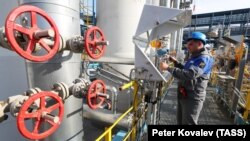On October 7, Russian President Vladimir Putin said Russia could increase gas supplies to Europe to ease the burden of rising natural gas prices.
Some contract prices for natural gas reportedly have risen 400 percent or more since the start of 2021. One factor explaining the increase was a cold winter last year, which led to abnormally high demand and depleted gas reserves.
Putin blamed the high prices on “hasty” and “politically motivated” moves, such as seeking energy alternatives. He then touted Russia as a reliable supplier of energy to Europe.
“Russia has always been a reliable gas supplier to consumers around the world, in Europe and in Asia, and always has fully met all its obligations,“ he said.
That is misleading. In fact, Russia has used its abundant natural gas reserves as political leverage over Europe.
Construction on Nord Stream II, a new natural gas pipeline carrying Russian gas running under the North Sea into Germany, is nearly completed. Still, a long certification process must be resolved before Russia’s state-owned natural gas monopoly, Gazprom, can begin using the pipeline. Russia has urged Berlin to speed the certification process, hinting that the new pipeline could solve the current crisis.
Meantime, Russia has been accused of deliberately curtailing supplies of gas that would normally transit Ukraine.
In September, the head of Naftogaz, Ukraine’s state-owned national oil and gas company, told CNBC that Russia was withholding gas supplies from Ukraine’s network, and thus from Ukraine and the rest of Europe. Later in September, Gazprom signed a deal to supply gas to Hungary via Turkstream, a Black Sea pipeline that also bypasses Ukraine.
Russia and Ukraine have been in conflict since Russia’s armed takeover of Ukraine’s Crimean peninsula in 2014, and Moscow continues to support an armed separatist movement in Ukraine’s eastern Donbas region.
In response, the U.S. has imposed sanctions on Russian companies and vessels involved in Nord Stream II. However, in May the U.S. issued waivers for the company operating Nord Stream II, as well as its CEO Matthias Warnig. In July, German Chancellor Angela Merkel announced a compromise with the United States to allow completion of Nord Stream II without further sanctions.
At the time, Merkel sought to assure Ukraine that it would benefit. She and U.S. President Joe Biden have said they would not allow Russia to use Nord Stream II as a political weapon. In August, the United States announced further sanctions on Russian companies, ships and pipelines. The Biden administration’s moves, implementing some sanctions while waiving others, has drawn opposition from Congress.
The jockeying over gas is nothing new for Russia.
"Natural gas has been the bedrock of Putin’s power both domestically and internationally for decades," Penn State academic Lena Surzhko Harned wrote in June. "Nord Stream 2 gives the Russian leader a new direct and powerful line of control in Western Europe."
In 2009, during a dispute between Ukraine’s Naftogaz and Russia’s Gazprom, Putin agreed to a proposal by Gazprom head Alexei Miller to cut gas deliveries via Ukraine.
Although the cuts did not lead to large-scale disruptions of gas deliveries to most EU nations, several Balkan countries were hit, along with Poland and the Czech Republic. Russia has also been involved in disputes with its neighbor Belarus over gas deliveries.
Ukraine has collected billions of dollars a year in fees to transit gas via its pipeline system from Russia to Europe. But not just the fees are threatened by Nord Stream II. As Aura Sabadus pointed out in an article for the Atlantic Council, redirecting gas flows around Ukraine via Nord Stream II could deprive Ukraine’s Black Sea regions of needed gas. Several of these regions are close to Crimea.
On October 13, Putin again blamed Europe for high gas prices and disputed claims that Russia was playing politics with gas. He claimed that Russia couldn’t increase supplies via Ukraine due to a lack of repairs and maintenance in the country's delivery network.
“Everyone keeps hinting [to] us: Increase the supply through Ukraine even more,” Putin said, according to the Russian state news agency TASS.
“It is dangerous to increase it! The gas transit system there has not seen repairs for decades. If we increase the pressure, the pipe will probably just burst. Europe will be left without this route at all.”
That claim, however, was clouded by Putin’s own spokesperson, Dmitry Peskov, that same day. In contrast to his boss, Peskov said that the problem with booking more gas via Ukraine was a matter of “competitive transit conditions.”
According to TASS, Peskov said that Kyiv should address "gas buyers in Europe, the European companies. They exactly can make a new long-term agreement with the Russian monopoly with increased quantities, considering growing demands for gas."
Referring to his own boss’ words that same day, Peskov said:
"The President reiterated if purchases of our gas continue, if contracts are increased and if Ukraine gives competitive commercial offers, all that will continue working.”
Yet, according to TASS, Peskov didn’t say anything about dangerous pipelines.
In other words, Russia’s reliability as a supplier remains iffy.





